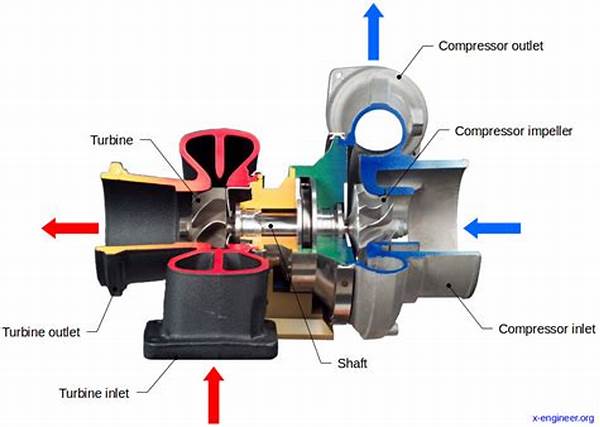
Turbocharger Design For Diesel Engines
When it comes to maximizing the efficiency and performance of diesel engines, turbocharger design plays a crucial role. The power boost provided by an expertly designed turbocharger is not just an added perk; it’s a necessity for those serious about reaching optimum engine capabilities. The right turbocharger design for diesel engines can transform a good engine into a great one, providing increased horsepower, improved fuel efficiency, and reduced emissions. Engine enthusiasts and professionals alike can benefit significantly from understanding how turbochargers work and why they are indispensable in today’s diesel engines marketplace. By investing in cutting-edge turbocharger design, you are choosing not only to enhance the power of your engine but also to join the growing movement toward more sustainable and efficient energy solutions.
Read Now : Intelligent Transport Management Systems
The Importance of Turbocharger Design for Diesel Engines
Diesel engine performance can be dramatically enhanced through a sophisticated turbocharger design. By incorporating advanced aerodynamics and the latest materials, manufacturers are crafting turbochargers that maximize air intake and combustion efficiency, leading to substantial gains in engine power and fuel economy. Turbocharger design for diesel engines is pivotal as it addresses one of the most crucial aspects of engine performance: air handling. Mechanically forcing more air into the engine means more fuel can be burned, resulting in a significant increase in power output and a marked improvement in overall efficiency. Moreover, the latest designs are focusing on reducing turbo lag, making vehicles more responsive and enjoyable to drive. This transformative effect is why modern diesel engines without turbochargers are becoming a rarity in both commercial and personal transportation sectors.
Key Features of an Effective Turbocharger Design
1. Air Flow Efficiency: The turbocharger design for diesel engines is crafted to improve air intake, ensuring more air is delivered to the engine, maximizing power output and efficiency.
2. Material Durability: Quality materials in turbocharger design resist high temperatures and pressures, ensuring the longevity and reliability of diesel engines.
3. Advanced Aerodynamics: Turbocharger design benefits from cutting-edge aerodynamic improvements, reducing energy losses and enhancing engine efficiency.
4. Precision Engineering: Each turbocharger design for diesel engines incorporates meticulous engineering to provide consistent and optimal performance.
5. Fuel Economy Improvements: By optimizing combustion, turbocharger design contributes significantly to reduced fuel consumption and lower operational costs.
Revolutionizing the Industry with Turbocharger Design
As emissions standards become ever stricter, the role of turbocharger design for diesel engines is increasingly vital. Turbochargers allow manufacturers to extract maximum power while maintaining or even decreasing engine displacements—a win-win in today’s eco-conscious world. These designs are crucial in developing engines that not only meet but exceed regulatory requirements while delivering an unmatched driving experience. Furthermore, turbocharger innovation is making diesel engines competitive in areas traditionally dominated by gasoline engines, opening up new possibilities in performance and efficiency. Embracing the latest in turbocharger technology is essential for any manufacturer or enthusiast looking to push the limits of what’s possible in diesel engine performance.
Benefits of Investing in Advanced Turbocharger Design
1. Enhanced Power Output: Effective turbocharger design for diesel engines dramatically boosts power, transforming vehicle performance.
2. Increased Torque: Modern turbochargers provide the high torque needed for heavy-duty applications, making them invaluable in industrial and commercial settings.
3. Reduced Emissions: Innovative turbocharger design minimizes emissions, contributing to cleaner and greener diesel engine technologies.
4. Noise Reduction: Advances in design reduce engine noise, improving the driving experience and making vehicles more appealing.
Read Now : Causes Of Ev Brake Malfunctions
5. Adaptability: Turbocharger designs are adaptable to a wide range of diesel engines, providing flexibility in various applications.
6. Lowered Operational Costs: Turbocharging results in better fuel efficiency, reducing overall operational expenses.
7. Sustainability: By improving efficiency and reducing emissions, turbocharger designs contribute to sustainable engineering practices.
8. Innovation Catalyst: Continual advancements in turbocharger design drive broader innovations across the powertrain sector.
9. Market Competitiveness: Vehicles capturing market share today increasingly rely on innovative turbocharger designs for superior performance.
10. Future-Readiness: Investing in the latest turbocharger design for diesel engines ensures readiness for future technological and regulatory changes.
Advanced Turbocharger Design Considerations
In the quest for superior turbocharger design for diesel engines, understanding market trends and technological advancements is crucial. Recent years have seen substantial improvements in materials and technology, with innovations like variable geometry turbochargers setting new benchmarks for performance and efficiency. These designs adapt to different engine speeds, providing optimal performance across a wide range of conditions. The growing collaboration between engineering and computer-aided design tools has further fueled the evolution of turbocharging technology. As engineers continue to push the boundaries, we can expect even more significant advancements on the horizon, ultimately leading to a new era of powerful, efficient, and eco-friendly diesel engines.
Future Prospects in Turbocharger Design
The future of turbocharger design for diesel engines is bright, with numerous possibilities waiting to be tapped. As manufacturers and engineers strive to balance performance, efficiency, and environmental concerns, turbochargers will play an even more pivotal role. The ongoing research and development efforts promise designs that not only enhance engine capabilities but also meet the growing demand for cleaner technologies. The evolution of electric turbochargers and hybrid systems is set to redefine the landscape, offering new solutions to traditional challenges. As we look forward, the commitment to innovation in turbocharger design will continue to shape the diesel engine industry, paving the way for a new era of automotive excellence.
Conclusion
The world of turbocharger design for diesel engines is not just about power; it is about achieving the perfect balance between performance, efficiency, and sustainability. As we navigate the challenges of modern engineering, turbochargers emerge as the linchpin that holds the promise of future advancements. Whether you are a manufacturer, engineer, or automotive enthusiast, embracing cutting-edge turbocharger technology is essential to stay competitive in today’s rapidly evolving market. Investing in the right design not only boosts engine performance but aligns with the broader goal of reducing environmental impact—all while driving innovation in the automotive world.